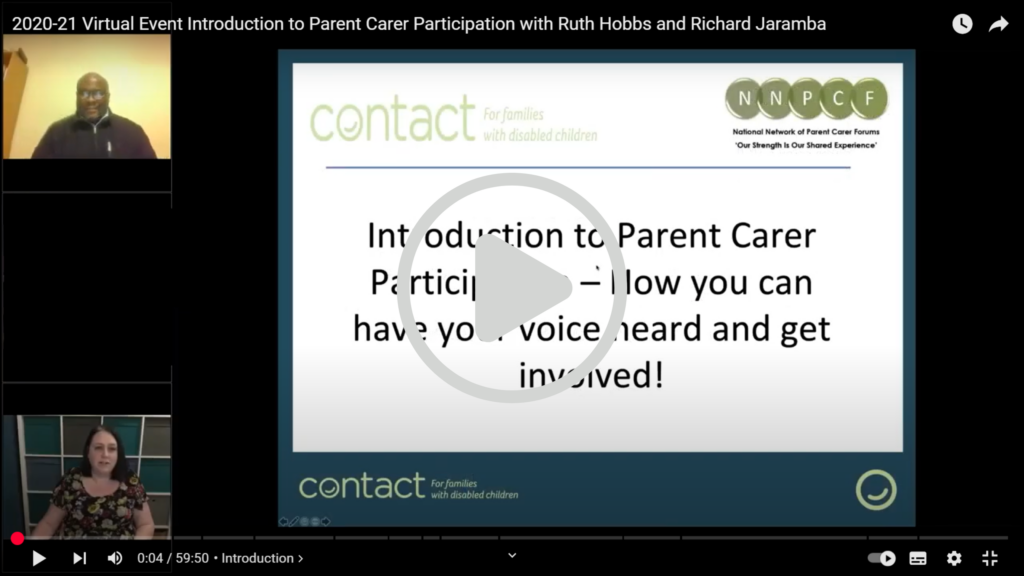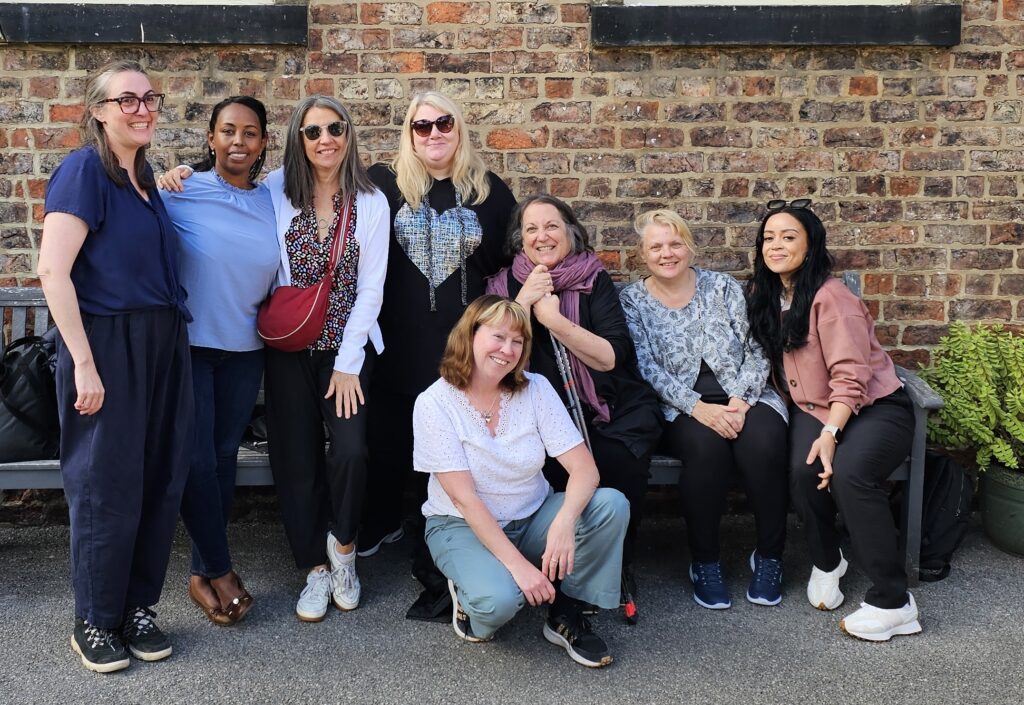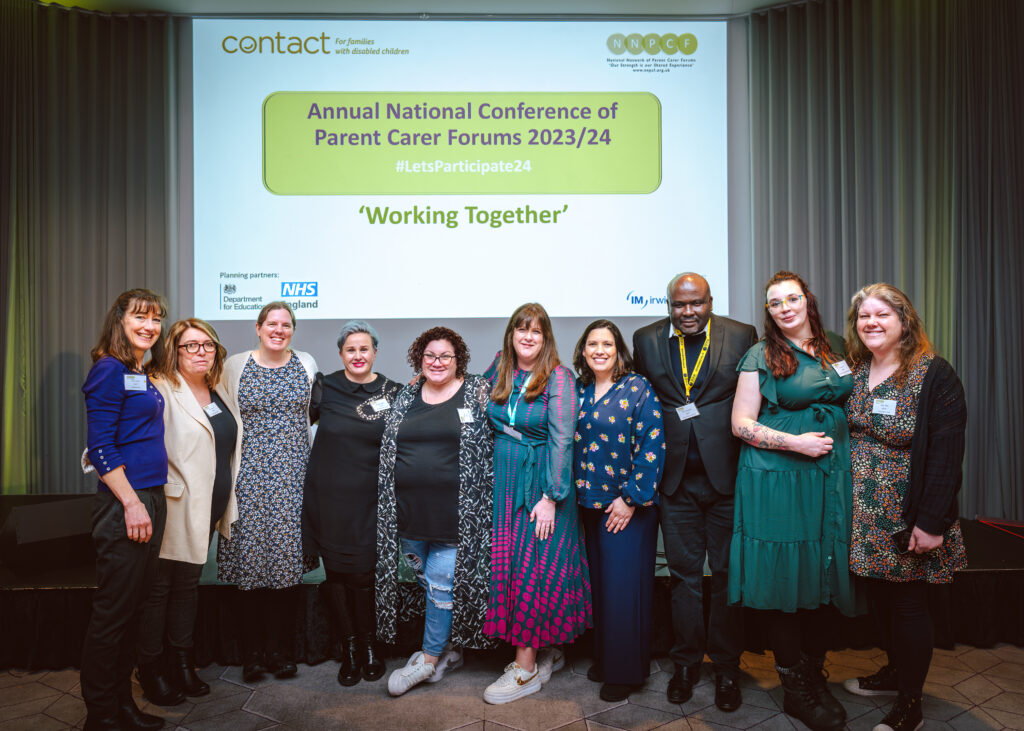Participation
Parent carer participation is when parents and service providers work together, recognising each other’s expert knowledge, to design, develop and improve services for children and young people with special educational needs and disabilities (SEND) aged 0 – 25 in the local area.
Parent carers can help to pinpoint challenges frequently experienced by families with children and young people with SEND. This knowledge is useful to service providers as they plan services to meet the needs of these families.
To carry out this work, forums will have parent carer representatives (reps) on different strategic workstreams with various partners. Forum reps are there to represent the voice of the forum membership. They use evidence from case studies, anecdotes, surveys, reports, or feedback from informal parent meetings. They present this information to providers to demonstrate the impact of services on families. Reps are there to represent the voice of the forum membership. They are not there to advocate for their own family and should try not to repeat their own lived experience too frequently but share wider experiences.
Often reference is made to a ‘ladder of co-production’ which extends from information then consultation through engagement/collaboration and on to co-design and co-production. Forums will experience all of these at different times and with different services. The ladder image suggest that it is a journey – the reality is that it is more like a scale or spectrum of involvement.
Almost every part of the scale is a form of participation but it is important that forums are clear on the differences and that in advocating for co-production they can articulate to local services when the offer falls short of this ideal.
Co-production and other forms of participation
Coproduction and participation describe a range of different kinds of activities aimed at enabling parent carers to give their views, experiences and ideas to help make changes to services.
The aim of forums is to work in co-production with local services to effect change. This means working with local services at the start of a piece of work. This includes improving, developing, reviewing, evaluating or creating new services for children and young people with SEND. This is the ideal. Sometimes, the only option is to work differently with the same services.
Sometimes true coproduction from the start can’t be done, either because of budget or time frame restrictions or because a piece of work has been ongoing and urgently needs parent carer views to help finalise it. In these circumstances, parent carer forums need to work differently with services.
Example: when forums are invited to join a strategic group part way through a piece of work or offer different ways for services to listen to the views of parent carers such as via focus groups or consultation meetings.
The scale of participation
The forum and the families they represent are helped to understand the service design and delivery so that they gain relevant knowledge about it.
When this works well:
- Briefings or information is given about the process that will be followed, background information about the current services, criteria, budget and an outline of what needs to be changed and why so that they can be properly informed before being involved in other kinds of participation.
- Parent carers are informed about their legal rights. This can be written or presented in meetings
- Pre-meetings with parent carers or reps to enable them to understand the agenda and where they can give their views.
- Post meeting discussions where the meeting chair or representative discusses how they felt this went and to identify any learning points/things that were unsaid.
Pitfalls to avoid
- Parent carers aren’t informed about changes to services until after decisions have been made.
- Services are changed and parents haven’t been involved in the process.
- Inaccurate information is given
The forum and the families they represent may be asked to fill in surveys or attend meetings.
When this works well:
- It forms part of a whole series of activities aimed at finding out the experiences, views and ideas from parent carers.
- forums are involved in helping to design the questions or meeting format and information that goes out to families.
- Parent carers are given clear information about the purpose of the survey or meetings.
- Meetings are well planned and facilitated.
- Services give feedback to the forum and parent carers about next steps as well as the outcome of the survey/meeting, e.g what has been done as a result of what parent carers have said.
- Parent carers are involved in a lawful consultation which includes the following aspects:
- The consultation should be carried out fairly and include details of:
- who should be consulted including those who use the current service, those who may need the service in the future and those who are likely to be worse off as a result of a proposed action
- How the consultation will be carried out including a range of options to reach as many people as possible drawing on other organisations, social media, newsletters and the parent carer forum.
- When the consultation will be carried out giving sufficient time for parent carers to give their views and at a very early stage in the development of ideas. The forum should be involved at the very start of project/strategy.
- An outline of realistic alternatives and the main reasons for the authorities preferred option.
- Evidence based and objective analysis of the data collected after the consultation period should be shared with the forum and parent carers.
- See our consultation checklist.
- The consultation should be carried out fairly and include details of:
Potential pitfalls:
- Parent carers have been asked the same questions before and nothing was done as a result. Always check what information you already have before carrying out another survey to prevent survey fatigue.
- Not following a lawful consultation may result in the service having to stop the process and start a lawful consultation process which can be costly.
- If the forum are supporting an unlawful consultation process there is the risk of the forum losing trust with parent carers.
- Consultation can be considered tokenistic if parent carers:
- Don’t have the power to influence or bring about change.
- Decisions have already been made.
- Aren’t given the full information about the purpose of the meeting or survey
- The questions are skewed to get a particular result.
- Parent carers aren’t given feedback about how their views have been used to change services.
Read more about consultations from:
Compared with consultation, the forum and the families they represent are given more opportunities to express their views and may be able to influence some decisions. The level of engagement or collaboration will depend on the people responsible for the services and/or time constraint of the project.
When this works well:
- The forum may be asked to join a strategic group when a lot of work has already been done and decisions made but they may be able to influence some elements of the work such as how a strategy is implemented, the information given to families, survey questions and consultations.
- Clear information is needed about what can and can’t be changed about a piece of work so the forum are clear about what they can and can’t influence.
Potential pitfalls:
- Not being clear with participants about what can and can’t be changed leading to loss of trust with services.
- The forum are involved at a very late stage and are asked to rubber stamp decisions already made and support a service to present this to parent carers.
- No options are given to parents so they only see the option the service wants to choose.
The forum and the families they represent are involved in designing services or facilities, based on their experiences and ideas. They have genuine influence but have not been involved in ‘seeing it through’ from start to finish.
What this works well:
- Building perhaps on consultations and collaboration, this is a moment when a Forum is involved in the design of an element of a service; the presentation of information to users; etc.
- This is a good activity to be involved with but it will again be limited to the areas identified by the service provider as being ‘appropriate’ for co-design.
An equal relationship between the forum and the families they represent and those responsible for services. They work together to decide how services should be delivered.
When this works well:
- True co-production can be seen if the starting point is a challenge, a gap, or an aspiration.
- The forum are involved at the outset of a piece of work including looking at terms of reference, budget, current services and costs, data about numbers of parent carers receiving relevant services and understanding the process to be followed to make decisions.
- The forum, the service provider and others work from the outset –using wider consultation and collaboration exercises – but always open to new ideas and transparent with all information.
Why is co-production the ideal?
Co-production is when parent carer forums are fully engaged in shaping, developing, implementing and evaluating services and systems. Parent reps work through the issues raised through the parent carer experiences in their area, developing joint solutions that make services for all families as effective as possible within the budget available.
It is an equal and reciprocal relationship where everyone’s knowledge and skills are used to create better outcomes. Evidence shows that working in co-production makes the best use of peoples’ time and money, while also improving outcomes for disabled children and young people.
An example of co-production
Genuine Partnerships describe co-production as having four principles, or cornerstones.
These are:
- Welcome & Care.
- Value & Include.
- Communicate.
- Work in Partnership.
Developing and nurturing each of these principles builds:
Trust
The Four Cornerstones have been developed into a quality indicator framework. This enables local areas to reflect on how well they are co-producing and helps embed co-production across organisational culture.
Video: The Warwickshire co-production journey
- NHS England: An introduction to co-production and what good co-production looks like.
- MIND: Lived experience Influence and Participation toolkit
- Council for Disabled Children (CDC) : Making participation work including an audit tool to assess participation
- Social Care Institute for excellence (SCIE): Co-production training and resources for health and social care managers commissioners, frontline practitioners, people who use services and carers.
Do you have any thoughts about this page? Visit our How to feedback page to share them.
Looking for something else? You can find a full list of pages on our Parent carer forum handbook contents page.
Find out more about participation and co-production

Introduction to parent carer participation
Click here to watch our YouTube video
Watch videoGenuine Partnerships
Find out more about Genuine Partnerships
Find out more
How associate support helped embed co-production in Herefordshire
Click here to watch our YouTube video
Watch video
Families in partnership: Our co-production journey in Worcestershire
Click here to watch our YouTube video
Watch videoRelated content

Contact Parent Carer Participation Advisers
Parent Carer Participation Adviser's support the forum and provide a sounding board for the forum leadership. Find your forum's named adviser here.
Read more
National Network of Parent Carer Forums (NNPCF)
In this section, we look at the role of the NNPCF that all forums are a member of.
Read more